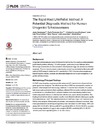Please use this identifier to cite or link to this item:
https://accedacris.ulpgc.es/jspui/handle/10553/54771
| Title: | The rapid-heat LAMPellet method: A potential diagnostic method for human urogenital schistosomiasis | Authors: | Gandasegui, Javier Fernández-Soto, Pedro Carranza-Rodríguez, Cristina Pérez-Arellano, José Luis Vicente, Belén López-Abán, Julio Muro, Antonio |
UNESCO Clasification: | 320505 Enfermedades infecciosas 320103 Microbiología clínica 320507 Neurología |
Keywords: | Schistosoma haematobium LAMP |
Issue Date: | 2015 | Publisher: | 1935-2727 | Journal: | PLoS Neglected Tropical Diseases | Abstract: | BACKGROUND: Urogenital schistosomiasis due to Schistosoma haematobium is a serious underestimated public health problem affecting 112 million people - particularly in sub-Saharan Africa. Microscopic examination of urine samples to detect parasite eggs still remains as definitive diagnosis. This work was focussed on developing a novel loop-mediated isothermal amplification (LAMP) assay for detection of S. haematobium DNA in human urine samples as a high-throughput, simple, accurate and affordable diagnostic tool to use in diagnosis of urogenital schistosomiasis. METHODOLOGY/PRINCIPAL FINDINGS: A LAMP assay targeting a species specific sequence of S. haematobium ribosomal intergenic spacer was designed. The effectiveness of our LAMP was assessed in a number of patients´ urine samples with microscopy confirmed S. haematobium infection. For potentially large-scale application in field conditions, different DNA extraction methods, including a commercial kit, a modified NaOH extraction method and a rapid heating method were tested using small volumes of urine fractions (whole urine, supernatants and pellets). The heating of pellets from clinical samples was the most efficient method to obtain good-quality DNA detectable by LAMP. The detection limit of our LAMP was 1 fg/µL of S. haematobium DNA in urine samples. When testing all patients´ urine samples included in our study, diagnostic parameters for sensitivity and specificity were calculated for LAMP assay, 100% sensitivity (95% CI: 81.32%-100%) and 86.67% specificity (95% CI: 75.40%-94.05%), and also for microscopy detection of eggs in urine samples, 69.23% sensitivity (95% CI: 48.21%-85.63%) and 100% specificity (95% CI: 93.08%-100%). CONCLUSIONS/SIGNIFICANCE: We have developed and evaluated, for the first time, a LAMP assay for detection of S. haematobium DNA in heated pellets from patients´ urine samples using no complicated requirement procedure for DNA extraction. The procedure has been named the Rapid-Heat LAMPellet method and has the potential to be developed further as a field diagnostic tool for use in urogenital schistosomiasis-endemic areas. | URI: | https://accedacris.ulpgc.es/handle/10553/54771 | ISSN: | 1935-2727 | DOI: | 10.1371/journal.pntd.0003963 | Source: | PLoS Neglected Tropical Diseases [ISSN 1935-2727], v. 9 (7), e0003963 |
| Appears in Collections: | Artículos |
SCOPUSTM
Citations
51
checked on Jun 8, 2025
WEB OF SCIENCETM
Citations
50
checked on Feb 8, 2026
Page view(s)
71
checked on Jan 11, 2026
Download(s)
100
checked on Jan 11, 2026
Google ScholarTM
Check
Altmetric
Share
Export metadata
Items in accedaCRIS are protected by copyright, with all rights reserved, unless otherwise indicated.
